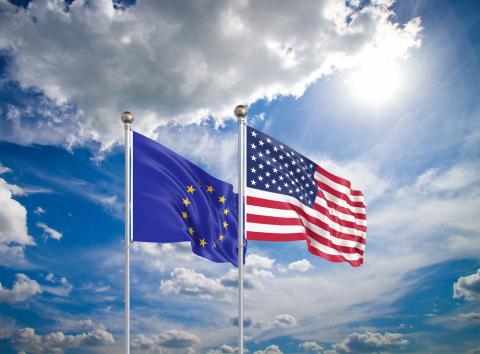European Economic
and Social Committee
Strengthening transatlantic ties in defense of our democracies
The EESC’s Transatlantic Relations Follow-up Committee met to discuss two current and timely topics with the aim of strengthening the EU-US partnership on a global scene, particularly important in the current challenging international context: the state of play of the transatlantic trade policy and the Year of Action between the two Summits for Democracy.
Democracy is like oxygen; you cannot see it, you cannot smell it, you don't even realize it is there. Until it's gone.
Those were the words used by MEP Katalin Cseh, resonating strongly amongst the EESC members, their distinguished guests and participants during the meeting.
Christian Moos, president of the Transatlantic Relations Follow-up Committee, underlined that the EU-US partnership needed to be strengthened further, and added: We must strengthen the resilience of our democracies which is inseparable from a rule-based international order and a value-based multilateralism. Defending openness and at the same time deepening the cohesion of like-minded countries in the Alliance for Democracy is extremely important. Otherwise we will eventually be dominated by authoritarian unfriendly powers, which are already very active in our sphere.
Bernd Lange, Member of the European Parliament and Chair of Committee on International Trade, stressed the importance of stabilizing partnerships with like-minded-countries, pointing out the need for faster ratification of ongoing and future trade agreements. He presented the recent positive developments in the transatlantic trade policies, be it the Airbus-Boing case, steel and aluminum tariffs or the Spanish black olives dispute, and put a special accent on the encouraging results of the work of the ten working groups of the Tech and Trade Council (TTC).
Timo Vuori, EESC member and rapporteur of the on-going own-initiative opinion “The new EU-US Trade and Technology Council in action”, said: Even more so in light of events in Ukraine, trade is no longer just trade, it has to be linked to geopolitics” and added that "we have to avoid the mistakes of the Transatlantic Trade and Investment Partnership (TTIP).
Mr Moos stated that the piecemeal approach the EU and the US have chosen with the TTC proves to be effective, but we need to speed up our efforts. The system rivals must not succeed in severing our transatlantic ties. They must more than ever become a supporting pillar for the defense of democracy and free, fair and sustainable trade world-wide.
Civil society is the backbone of democracy
It seems that the Summit for Democracy convened a year ago was prophetic, as we find ourselves today in a global battle of democracies on one side and authoritarianism on the other
, said Mr. Dimitris Dimitriadis, President of the EESC's External Relations section.
According to MEP Katalin Cseh, the Summit shows that it is still possible to convene around the concept of democracy and that the idea continues to have meaning for so many citizens. The value and the meaning of democracy are however not self-evident concepts anymore; they need constant nurturing. Where building back democracies is needed, we need to start with the civil society, the backbone of democracy. In this defining moment when we choose whether we are willing to fight for the values on our flags, the EU needs to lead the way.
To this end, Sammie Shirey, Senior Leader of the Summit for Democracy team in the US State Department, emphasized: The first Summit served as a platform for discussion on the challenges democracies are facing. Commitments were made to face these challenges. Now, it's time to move these commitments beyond words.
The US has identified 4 concrete objectives: (i) fulfilling Summit's commitments; (ii) developing the Summit declaration; (iii) crafting an inclusive Summit 2 agenda; (iv) institutionalizing the Summit's themes and commitments. Concrete measures and several fora are to contribute to those objectives: The Focal Group on the governmental level, Democracy Cohorts as multistakeholder groups organized around specific topics under Summit themes with representatives of civil society, as well as informal consultations with the civil society.
Ms Annika Silva-Leander from International IDEA presented their action in support of the Summit for Democracy, adding that the Summit for Democracy is a strategic opportunity to place democracy at the center of the global agenda and protect it for future generations. The war in Ukraine underscores even more the need for democracies to stand united in the face of authoritarian threats.
Mr Jacob Kurtzer, Director and Senior Fellow at the Center for Strategic and International Studies pointed out the intricate links between the Summit's priorities, particularly advancing human rights, fighting corruption and combatting authoritarianism, and the reduction in humanitarian needs across the world. The US and the EU are historically overwhelmingly the largest contributors to humanitarian action and have to set the example of strengthening democracy both domestically and internationally.
Finally, Ms Antonella Valmorbida, Secretary General of the European Association for Local Democracy and President of the European Partnership for Democracy, pointed out the need to create bridges with the civil society and stressed, It seems more important than ever to continue the momentum created by the first Summit. As people around the world are fighting for democracy, the EU should strive towards more visibility of its action, improved coordination and higher ambitions.
Work organisation
Downloads
-
Strengthening transatlantic ties in defense of our democracies
